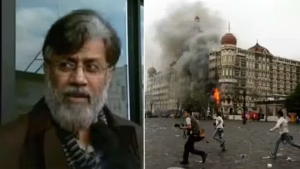
This coincides with the extradition of Tahawwur Rana from the United States to India, who is suspected of organizing the 26/11 terror attacks in Mumbai.
Rana will be held in the high-security wing of Tihar Jail after arriving on a chartered jet on Thursday.
To return him, a multi-agency team from India had flown to the United States.
In the 26/11 case, Rana’s extradition marks significant progress.
Rana, a Pakistani-origin Canadian national, is an associate of David Coleman Headley, one of the key conspirators of the 2008 Mumbai terror attacks.
Headley asserted that Rana supported the terror operation’s preparations and provided financial and logistical assistance. Headley had taken the identity of an employee of Rana’s immigration company to conduct a reconnaissance of Mumbai prior to the attacks. About 166 people were killed in the attacks.
Detail of the attack 26/11 attacks: A tragic chapter in India’s history
“In exercise of the powers conferred by sub-section (1) of section 15 of the National Investigation Agency Act, 2008 (34 of 2008),…the Central Government hereby appoints Narender Mann as Special Public Prosecutor,” said Abhijit Sinha, Joint Secretary (MHA), in a notification announcing Mann’s appointment. He will conduct the trial and other matters on behalf of the NIA before the NIA Special Courts at Delhi and Appellate Courts for three years or until the completion of the trial.
Headley
Headley has already confessed. According to the National Investigation Agency (NIA), Headley and Rana collaborated with members of Lashkar-E-Taiba (LeT) and Harkat-ul Jihadi Islami (HUJI), both of which have been designated as terrorist organizations by India, in a criminal conspiracy to “commit terrorist acts in New Delhi and other places in India.” Headley has already admitted guilt for the attacks. For terrorism-related offenses connected to both the Mumbai attacks and a planned attack on a Danish newspaper, he is currently serving a 35-year sentence in the United States.
Extradition approval
Rana’s lawyers argued his extradition would violate US laws
In the meantime, Rana’s final appeal against his extradition was overturned by the US Supreme Court. Rana’s lawyers argued that his extradition to India would violate US laws as well as the UN Convention Against Torture.
They asserted that given his history, there were substantial reasons to believe he would be tortured in India. IE was informed by sources that Rana would be taken into custody and videotaped before a court once he arrived in Delhi.